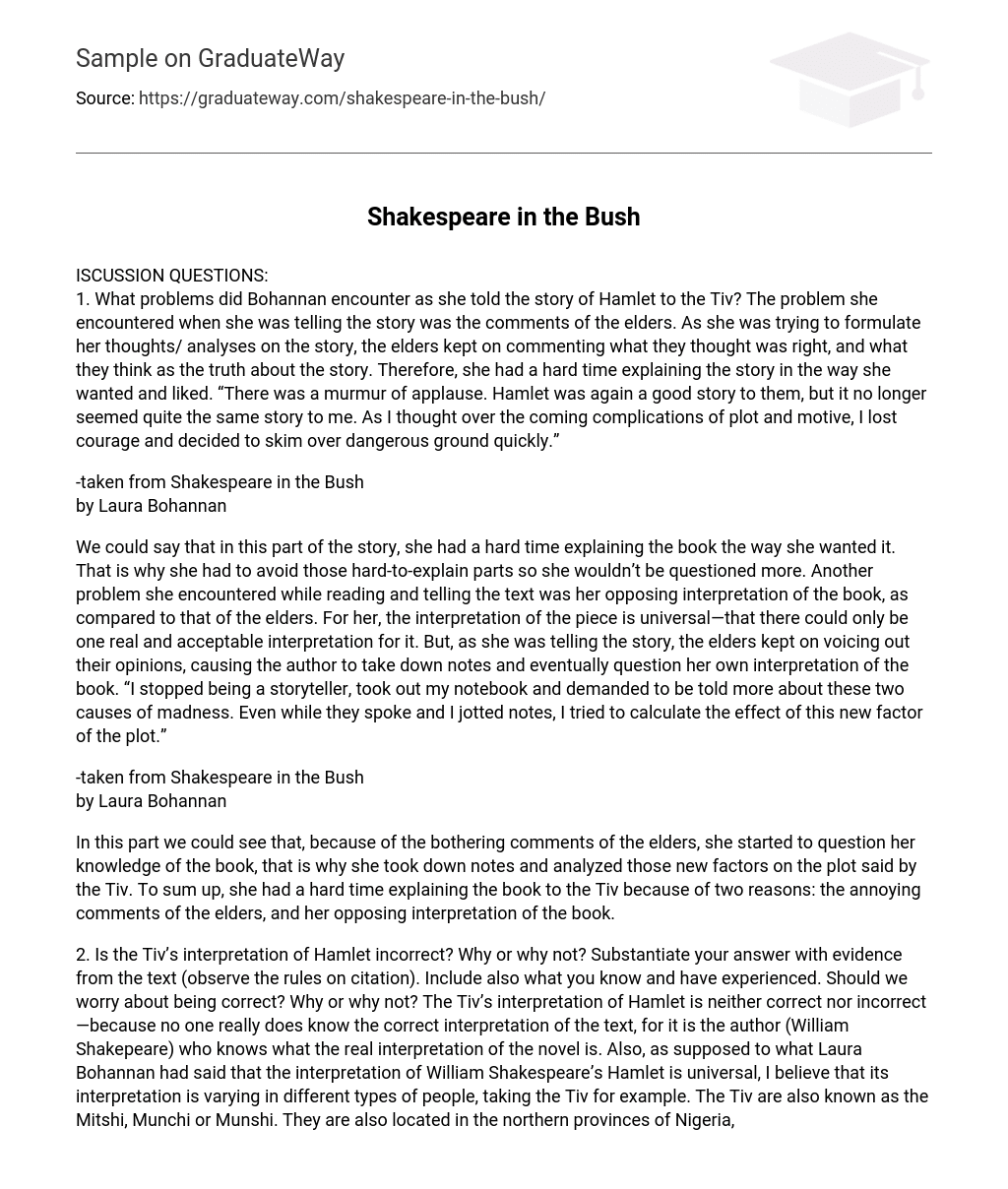ISCUSSION QUESTIONS:
1. What problems did Bohannan encounter as she told the story of Hamlet to the Tiv? The problem she encountered when she was telling the story was the comments of the elders. As she was trying to formulate her thoughts/ analyses on the story, the elders kept on commenting what they thought was right, and what they think as the truth about the story. Therefore, she had a hard time explaining the story in the way she wanted and liked. “There was a murmur of applause. Hamlet was again a good story to them, but it no longer seemed quite the same story to me. As I thought over the coming complications of plot and motive, I lost courage and decided to skim over dangerous ground quickly.”
-taken from Shakespeare in the Bush
by Laura Bohannan
We could say that in this part of the story, she had a hard time explaining the book the way she wanted it. That is why she had to avoid those hard-to-explain parts so she wouldn’t be questioned more. Another problem she encountered while reading and telling the text was her opposing interpretation of the book, as compared to that of the elders. For her, the interpretation of the piece is universal—that there could only be one real and acceptable interpretation for it. But, as she was telling the story, the elders kept on voicing out their opinions, causing the author to take down notes and eventually question her own interpretation of the book. “I stopped being a storyteller, took out my notebook and demanded to be told more about these two causes of madness. Even while they spoke and I jotted notes, I tried to calculate the effect of this new factor of the plot.”
-taken from Shakespeare in the Bush
by Laura Bohannan
In this part we could see that, because of the bothering comments of the elders, she started to question her knowledge of the book, that is why she took down notes and analyzed those new factors on the plot said by the Tiv. To sum up, she had a hard time explaining the book to the Tiv because of two reasons: the annoying comments of the elders, and her opposing interpretation of the book.
2. Is the Tiv’s interpretation of Hamlet incorrect? Why or why not? Substantiate your answer with evidence from the text (observe the rules on citation). Include also what you know and have experienced. Should we worry about being correct? Why or why not? The Tiv’s interpretation of Hamlet is neither correct nor incorrect—because no one really does know the correct interpretation of the text, for it is the author (William Shakepeare) who knows what the real interpretation of the novel is. Also, as supposed to what Laura Bohannan had said that the interpretation of William Shakespeare’s Hamlet is universal, I believe that its interpretation is varying in different types of people, taking the Tiv for example. The Tiv are also known as the Mitshi, Munchi or Munshi. They are also located in the northern provinces of Nigeria, with the majority of them living in the Tiv Division of Benue Province (Bohannan and Bohannan 1953:9). Knowing the life of these people are just ordinary, everyone wouldn’t expect that such people could be able to give their insights/knowledge about the text—yet, they were able to give their own interpretation of it. How? By applying their knowledge and experiences in life.
They were able to apply these things so that they will be able to understand the next happenings more accurately, and to comprehend a text which is very hard to understand. “Listen,” said the elder, “and I will tell you how it was and how your story will go, then you may tell me if I am right. Polonius knew his son would get into trouble, so he did. He had many fines to pay for fighting, and debts from gambling. But he had only two ways of getting money quickly. One was to marry off to his sister at once, but it is difficult to find a man who will marry a woman desired by the son of the chief. For if the chief’s heir commits adultery with your wife, what can you do? Only a fool calls a case against a man who will someday be his judge. Therefore Laertes had to take the second way: he killed his sister by witchcraft, drowning her so he could secretly sell her body to the witches.” -taken from Shakespeare in the Bush
by Laura Bohannan
In this part of the story, the Tiv used their knowledge and experiences to interpret the plot accurately and effectively. That is why they were able to predict precisely what Laertes did to his sister Ophelia, and so as the next happenings in the story. “Sometime,” concluded the old man, gathering his ragged toga about him, “you must tell us some more stories of your country. We, who are elders, will instruct you in their true meaning, so that when you return to your own land your elders will see that you have not been sitting in the bush, but among those who know things and who have taught you wisdom.” -taken from Shakespeare in the Bush
by Laura Bohannan
In that part of the story, we could really see that these people, the Tiv, really have experiences that they were able to use in interpreting Hamlet. We could also see in this excerpt from the text that, even though they are just people sitting around the bush, they are more knowledgeable than we are, because they have these experiences that helped shape their perspectives in the different aspects of life. And, to answer the question of whether we should worry or not worry if our interpretation of a text is correct or incorrect, I think we shouldn’t. What is important is that we are able to understand the text, and finally, learn something from it.





